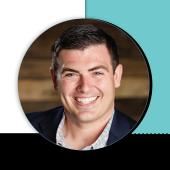The ACC Top 10 30-Somethings awards recognize in-house counsel between the ages of 30 and 39 for their innovation, approach to challenges, well-rounded perspectives, contributions to the in-house community, and pro bono and volunteer work.

Winnie Ling didn’t have a eureka moment when she knew she wanted to practice law. It was a slow realization. Her series of well-timed career pivots — some following only her gut — led her to an in-house position where she is responsible not only for the company’s legal functions but also human resources and strategic operations.
Pivots lead to a profession
Toward the end of high school in Sydney, Australia, Winnie helped elderly neighbors navigate the everyday realities of life: filling out housing forms and writing letters to request government services. She realized it’s a huge privilege to know how to navigate bureaucracy and the impact she could have on communities.
Entering university, she was intrigued enough with law to make it one of the tracks she studied – alongside a business degree majoring in finance, having also considered architecture. Law won out after she got a taste of corporate and transactional work, and the feeling of adding value, alongside the opportunity to work in cross-border settings, during her time as a summer associate and part-time paralegal at the Australian law firm Allens. Her pivot to study business and law set her on her path.
She accelerated her studies to graduate early and moved away from Australia, joining the London office of the UK law firm Freshfields where her colleagues were a mix of US and UK lawyers. “Maybe because London wasn’t home for me, I became friends with a lot of the US lawyers,” she reflects. With typical Australian egalitarianism she didn’t have an appreciation that certain tasks were typically reserved for US lawyers and others for UK lawyers. “It’s all in English, it’s all common law; what’s the difference?” she thought.
That sentiment led her to apply for the bar exam in New York state. After submitting her Australian law degree for approval by the bar, she gathered notes from her US colleagues, and booked a flight to New York City. But the bar exam was in Albany, hours away by train. It was her first time in the United States. “I was like where am I? This looks very different from TV.” She questioned using her vacation days to sequester herself in upstate New York in February cramming for the bar exam.
And yet her pivot to the United States opened doors. Landing at the law firm Davis Polk, she spent two years building the skills of an international corporate and securities lawyer. But she had a lingering sense that she had missed out on something — as accelerating her business and law degrees in Australia had meant giving up the opportunity to study abroad. Again following her gut, she took time out from legal practice and enrolled in a Masters of Law program at Columbia Law School. “Being a student in New York City is much different than working in New York City,” she summarizes. Her move paid off, and she was recruited by Cravath, Swaine & Moore LLP, widely regarded as the most prestigious US law firm, where she rotated through practice groups for seven years, honing her skills in capital markets, M&A, bank financing and other areas.
Moving in-house for the right opportunity
“People work for people; companies are just a collection of people,” Winnie points out philosophically. There’s no ideal timeline to move in-house, it’s always about the opportunity. For Winnie, that means a team where she can hit the ground running and constantly grow and learn from other people. She joined Blend, a platform used by financial institutions to power end-to-end consumer journeys for any banking product, to take it public. While she had done many IPOs and other strategic transactions as an outside counsel, this was her first chance to operationalize what it means to be a public company.
“Writing the words that go into the policies was the easy part. I then had to create corporate governance processes to implement those policies — figuring out “who” at the company should do “what,” “when,” and “how,” while thoughtfully influencing change across teams, was definitively more challenging and interesting,” she explains. A tenet of Blend is transparency with employees. “So when it came to the Insider Trading Policy, I asked myself: Do we take a blanket or surgical approach?” To ensure employees with sensitive financial information don’t violate internal trading laws, she designed a system that automated workflows so stakeholders give approvals with clear audit trails for stock trades.
"Writing the words that go into the policies was the easy part. I then had to create corporate governance processes to implement those policies — figuring out “who” at the company should do “what,” “when,” and “how,” while thoughtfully influencing change across teams, was definitively more challenging and interesting."
Winnie Ling
“Doing more with less”
After scaling rapidly for the IPO in 2021, Winnie faced a different set of challenges in 2022 and 2023: economic volatility and immense cost-cutting pressures. After a prolonged stock decline, the company faced a possible delisting. Winnie led initiatives that improved stock performance, strengthened investor relations, and ultimately prevented the delisting.
She and her team also took on more responsibilities. In her HR leadership capacity, she has redefined priorities to emphasize simplicity and flexibility, creating competitive and equitable compensation programs and fostering a culture of transparent communication. As part of strategic operations, Winnie oversees Blend’s international expansion efforts and bridges the gap between company’s strategic vision and day-to-day operations through process optimization and project management. Her efforts have been instrumental in maintaining Blend’s path to profitability despite market challenges.
With her track record of navigating intense organizational change, rebuilding company culture amidst disruption, and turning setbacks into challenges, Winnie exemplifies dynamic leadership, creativity and resilience.
And it’s likely that her next pivot will lead to many more successes.
Disclaimer: The information in any resource in this website should not be construed as legal advice or as a legal opinion on specific facts, and should not be considered representing the views of its authors, its sponsors, and/or ACC. These resources are not intended as a definitive statement on the subject addressed. Rather, they are intended to serve as a tool providing practical guidance and references for the busy in-house practitioner and other readers.







